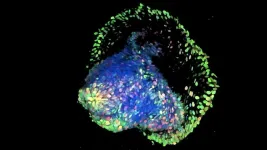(Press-News.org) New Zealand’s native stoneflies have changed colour in response to human-driven environmental changes, new research shows.
Just published in the journal Science, the University of Otago study provides arguably the world’s most clear-cut case of animal evolution in response to change made by humans.
Co-author Professor Jon Waters, of the Department of Zoology, says the stonefly has become a different colour due to recent deforestation.
“In natural forested regions, a native species has evolved ‘warning’ colours that mimic those of a poisonous forest species, to trick predators into thinking they are poisonous too.
“But the removal of forests since humans arrived has removed the poisonous species. As a result, in deforested regions the mimicking species has abandoned this strategy – as there is nothing to mimic – instead evolving into a different colour.”
Scientists have long wondered whether humans are causing evolutionary changes in natural populations.
The most well-known example of evolution caused by humans was the peppered moth population in the United Kingdom, which changed colour in response to industrial pollution in the 1800s.
But Professor Waters says even that case has been considered controversial.
This new study shows how humans have changed the way native species interact.
Co-author Dr Graham McCulloch says humans have disrupted ecological interactions between species that evolved over millions of years, but some of our native species are resilient enough to overcome this.
“This study is important because it shows that, at least for some of our native species, there is the possibility of adapting to the environmental changes caused by humans, even when the change is rapid,” Dr McCulloch says.
“It also shows that independent populations have undergone similar changes in response to deforestation – there have been similar shifts independently in different parts of the species’ range – showing that evolution can be a predictable process.”
END
Human actions cause insect color change
2024-10-24
ELSE PRESS RELEASES FROM THIS DATE:
New AI model could make power grids more reliable amid rising renewable energy use
2024-10-24
As renewable energy sources such as wind and solar become more widespread, managing the power grid has become increasingly complex. Researchers at the University of Virginia have developed an innovative solution: an artificial intelligence model that can address the uncertainties of renewable energy generation and electric vehicle demand, making power grids more reliable and efficient.
Multi-Fidelity Graph Neural Networks: A New AI Solution
The new model is based on multi-fidelity graph neural networks (GNNs), ...
Lurie Children’s helps train pediatricians to screen toddlers for mental health risk, with equity and ethics in mind
2024-10-24
One in five children has an identified mental health problem as early as age 3. Early detection is key to earlier intervention, and it also could prevent more severe conditions down the line, such as ADHD, depression and anxiety. Pediatric primary care is an ideal setting to conduct screening for mental health risk, given that pediatricians tend to have close, ongoing relationships with young patients and their families, and broad reach to historically marginalized communities. Since mental health screening of toddlers in primary care is uncommon, it is important to train pediatricians to do so without implicit bias and in a way that prevents unintended ...
UTEP researchers develop low-cost device that detects cancer in an hour
2024-10-24
EL PASO, Texas (Oct. 24, 2024) – Researchers at The University of Texas at El Paso have created a portable device that can detect colorectal and prostate cancer more cheaply and quickly than prevailing methods. The team believes the device may be especially helpful in developing countries, which experience higher cancer mortality rates due in part to barriers to medical diagnosis.
“Our new biochip device is low-cost — just a few dollars — and sensitive, which will make accurate disease diagnosis accessible to anyone, ...
Texas A&M physicist Kevin Kelly earns American Physical Society Early Career Award
2024-10-24
Dr. Kevin J. Kelly, an assistant professor in the Department of Physics and Astronomy at Texas A&M University and a member of the George P. and Cynthia Woods Mitchell Institute for Fundamental Physics and Astronomy, has been selected as the 2025 recipient of the American Physical Society’s Henry Primakoff Award for Early-Career Particle Physics in recognition of his contributions and promising career potential in fundamental particle physics and cosmology.
Kelly, who joined the Texas A&M faculty in 2022, works at the interface of two of the biggest outstanding mysteries in particle physics: ...
University of Maryland researcher awarded $1.8 million to study climate change’s impact on people with kidney disease
2024-10-24
Climate change is driving more extreme heat and more air pollution from wildfires, each of which put human health at risk. Now, new research funded by the federal Agency for Healthcare Research and Quality (AHRQ) and led by University of Maryland School of Public Health Professor Dr. Amir Sapkota, will study how these hazards independently and jointly impact already vulnerable groups, such as people living with end stage kidney disease (ESKD). The researchers aim to identify preventative solutions.
“During extreme heat, the damaged kidneys of people with ESKD do not regulate fluid levels very ...
Johns Hopkins Children’s Center research in mice suggests zinc supplements have potential value to directly treat short bowel syndrome
2024-10-24
Researchers from Johns Hopkins Children’s Center say they have identified a gene pathway involving the mineral zinc in mice that may someday point the way to using zinc-based supplements to directly help people with a rare disorder called short bowel syndrome (SBS).
The findings, published Oct. 7 in Nature Communications, help advance efforts toward more effective, potential treatment regimens for both children and adults with the debilitating condition.
SBS, which affects 10,000–20,000 adults and children in the United States, is marked by damage to and shortening of ...
Kalinin receives David Adler Lectureship Award
2024-10-24
Sergei Kalinin, a professor in the Department of Materials Science and Engineering, has been named the winner of the David Adler Lectureship Award in the Field of Materials Physics by the American Physical Society. The award recognizes one outstanding contributor in the field of materials physics who is notable for high-quality research, review articles, and lecturing.
“I am deeply honored to receive the Adler Award, as it recognizes the critical transition in materials discovery that my colleagues at the University of Tennessee and Pacific Northwest National Laboratory and I have championed,” ...
Evaluating the link between chemicals and declining insect populations
2024-10-24
Few people are fans of stink bugs, mosquitoes, or boll weevils, but insects play a key role in the circle of life that makes up the planet’s environment. In fact, world-renowned biologist E. O. Wilson famously declared that if insects vanished, our environment would collapse.
Scientists have noted that insect behaviour has been changing, and their populations are declining – on average 2-3% per year. This has prompted them to investigate the potential causes of this change, such as habitat loss due to overdevelopment, climate change, and chemical use.
EMBL researchers and collaborators recently investigated how pesticides, herbicides, ...
Scientists discover molecules that store much of the carbon in space
2024-10-24
A team led by researchers at MIT has discovered that a distant interstellar cloud contains an abundance of pyrene, a type of large, carbon-containing molecule known as a polycyclic aromatic hydrocarbon (PAH).
The discovery of pyrene in this far-off cloud, which is similar to the collection of dust and gas that eventually became our own solar system, suggests that pyrene may have been the source of much of the carbon in our solar system. That hypothesis is also supported by a recent finding that samples returned from the near-Earth asteroid Ryugu contain large quantities of pyrene.
“One of the big questions in ...
Sublethal agrochemical exposure disrupts insect behavior and long-term survivability
2024-10-24
Even at concentrations too low to kill, exposure to widely used agrochemicals – pesticides, herbicides, and fungicides, among others – has pervasive negative impacts on insect behavior and physiology, researchers report. The findings highlight the need for more comprehensive pesticide assessments, focusing not just on lethality but also on unintended long-term ecological harm to safeguard biodiversity. Over the past decade, many reports have highlighted alarming declines in insect ...





